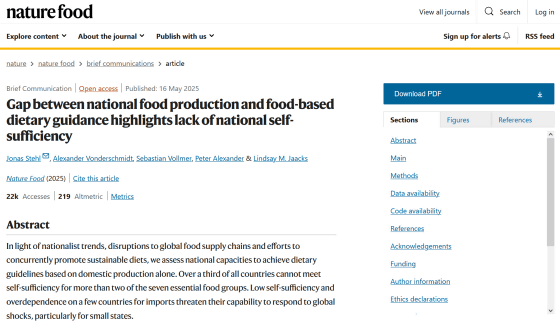Only one country in the world can produce all the food needed for a healthy and sustainable diet

In recent years, there have been frequent incidents that threaten the global food supply chain, such as the COVID-19 pandemic and the war between Ukraine and Russia. As the importance of food self-sufficiency within one's own country has come to light, a German and British research team investigated how well each country is able to produce the food needed for a 'healthy and sustainable diet' domestically.
Gap between national food production and food-based dietary guidance highlights lack of national self-sufficiency | Nature Food

Global trade vital to healthy food provision | The University of Edinburgh
https://www.ed.ac.uk/news/global-trade-vital-to-healthy-food-provision
Just One Nation Produces Enough Food For Itself, Scientists Reveal : ScienceAlert
https://www.sciencealert.com/just-one-nation-produces-enough-food-for-itself-scientists-reveal
Most studies on food self-sufficiency rates of countries have assessed calorie self-sufficiency rates based on consumption patterns at the time of the study. However, a research team from the University of Göttingen in Germany and the University of Edinburgh in the UK analyzed trends in self-sufficiency rates with a focus on 'healthy and sustainable diets' rather than just calories.
To evaluate healthy and sustainable diets, the research team investigated the food groups that make up the LiveWell Diet , developed by the World Wildlife Fund (WWF) . The WWF LiveWell Diet advocates a focus on plant-based foods such as fruits, vegetables, legumes and whole grains, and low intake of meat, dairy and eggs, in order to achieve a healthy and sustainable diet.
WWF claims that by implementing the LiveWell Diet, countries can improve their health by reducing their intake of fat, salt, sugar, etc., while reducing the negative impact on the climate and nature. The research team evaluated the self-sufficiency rate of each country for the seven food groups that make up the LiveWell Diet: fruits, vegetables, dairy products, fish, meat, legumes, nuts and seeds, and starchy staples.

The analysis found that only one country out of 186 worldwide is self-sufficient in all seven food groups essential to the LiveWell Diet.
The only country to achieve self-sufficiency in seven food groups was
Only one in seven countries was self-sufficient in five or more food groups, and more than one-third of countries, including Japan, were self-sufficient in two or fewer food groups. The low self-sufficiency rates were particularly notable in the Caribbean, West Africa, and the Middle East, with Afghanistan, the United Arab Emirates, Iraq, Qatar, Yemen, and Macau all reporting that they were not self-sufficient in any food group.
The figure below shows the self-sufficiency rates of 'Fruits,' 'Vegetables,' 'Dairy,' 'Fish,' 'Meat,' 'Legumes, nuts, and seeds,' and 'Starchy staples' by country, in that order. Light blue indicates a self-sufficiency rate of 100% or more, and the darker the red, the lower the self-sufficiency rate. 47% of countries have achieved self-sufficiency in fruits, 24% in vegetables, 44% in dairy products, 25% in fish, 65% in meat, 46% in beans, nuts, and seeds, and 45% in starchy staples.

Overall, the self-sufficiency rate for vegetables is low and the self-sufficiency rate for meat is high, but this is due to the LiveWell Diet's emphasis on plant-based foods such as vegetables and its restriction of meat consumption. Of the seven food groups, meat was the only one for which Japan was able to achieve self-sufficiency.
While countries trade to meet food shortages and meet their population's needs, many rely on a single trading partner for more than half of their food imports, making them vulnerable to market shocks. Therefore, the research team argues that it is important to maintain diverse trade networks between countries and regions.
'International food trade and cooperation are essential for healthy and sustainable diets. But heavy import dependency on a single country can leave that country vulnerable. Building resilient food supply chains is necessary to ensure public health,' said Jonas Stehr , lead author of the study and a doctoral student at the University of Göttingen.
Related Posts:
in Free Member, Science, Food, Posted by log1h_ik







